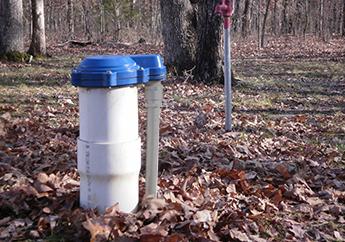Missouri Geological Survey Director: Carey Bridges, RG

Private water wells are vital to farmers and rural residents who do not have access to water from public water systems. In times of flooding, these wells can quickly become conduits for floodwaters – and the pollutants they carry – to contaminate the groundwater that serves not only the farm or residence from which the contamination originated but also any well that draws from the same aquifer.
When flooding is imminent, these actions are to be taken by owners of private water wells
Ensure the well cap is free from cracks and is secured to the well casing. It should fit snugly so potential pollutants don’t find their way into the well system and contaminate groundwater.
Additional guidance regarding water wells that have vents
- Turn off power to the well.
- Seal the vent (and any other opening) with silicone caulk or equivalent (this will need to be removed before restarting the well).
- Discontinue operation until floodwaters subside.
Additional guidance regarding water wells that do not have vents
- Turn off power to the well.
- Ensure electrical wire hole, drop pipe hole or any other opening in the well cap is sealed with silicone caulk or equivalent (this will need to be removed before restarting the well).
- Discontinue operation until floodwaters subside.
Disinfecting private water wells
- Disinfecting Your Water Well - PUB2733 – Fact Sheet
- Disinfecting Your Water Well – Video
Nothing in this document may be used to implement any enforcement action or levy any penalty unless promulgated by rule under chapter 536 or authorized by statute.
For more information
Department of Natural Resources
1101 Riverside Drive
P.O. Box 176
Jefferson City, MO 65102-0176
United States
